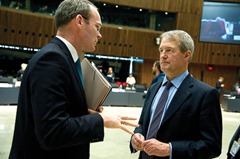Agricultural differences
 Peter Cheney compares the British and Irish Governments’ approaches to agriculture, which help to explain DARD’s close working relationship with the Republic.
Peter Cheney compares the British and Irish Governments’ approaches to agriculture, which help to explain DARD’s close working relationship with the Republic.
While officially represented by the UK Government in Europe, Northern Ireland’s farmers and their representatives have much more in common with the Irish Government’s approach to agricultural policy. This was demonstrated by Irish Agriculture Minister Simon Coveney’s visit to the DUP conference last November: an unlikely combination for political reasons but a pragmatic one on economic grounds.
Britain has been a sceptic on the Common Agricultural Policy since the 1970s as it is a net contributor rather than a net beneficiary. The UK’s Department for Environment, Food and Rural Affairs is seeking to reduce farm subsidies with the goal of making agriculture a sustainable sector in the free market.
Speaking at an Anglo-Irish food summit in May, Environment Secretary Owen Paterson said that “ideally” he would like farming in Europe to be “driven by market signals not subsidy although this will not happen in this CAP round that runs to 2020.” He held up New Zealand as a market-led success.
Paterson did see a clear role for tax-payers’ money in “rewarding farmers for the public and environmental goods they provide for which there is no market mechanism.” This refers to funding for rural development and environmental management.
Northern Ireland, though, is the UK region with the highest reliance on agriculture. Last year, 5.9 per cent of the workforce was employed in farming compared to
1.1 per cent in England. The province receives 10 per cent of the single farm payment funding allocated to the UK. With our relatively small holdings, farming is very much part of the pattern of Irish agriculture.
Agriculture Minister Michelle O’Neill strongly prefers CAP over the free market. “My position is clear,” she told the Assembly last November. “I do not support a reduction in the CAP budget. I will continue to fight for a strong and adequate budget. That is the position that I take in Europe and with the Department for Environment, Food and Rural Affairs.”
O’Neill and other local representatives have therefore found common cause with Coveney who has defended the CAP budget against UK pressure for cuts.
At the outset of the Irish Presidency of the Council of the European Union, Coveney stated: “For the future, the challenge is to produce more to meet the increasing demands for food from a growing world population while at the same time maintaining production methods that are sustainable in all meanings of the word: economically, environmentally and socially.”





